The diverse natural wonders of Sydney and New South Wales showcase the very best Australia has to offer. From star-studded skies in the outback to intricate mountain scenes and sparkling Sydney beaches, here in NSW, we have it all. Stay cool on the coast in summer (December to January), watch the trees turn golden in autumn (March to May), cosy up by the fireplace or visit the ski fields in winter (June to August) and watch the state bloom into beauty with seasonal flowers such as purple jacarandas in spring (September to November). Here are the places to go to in NSW to see unique Australian natural beauty.
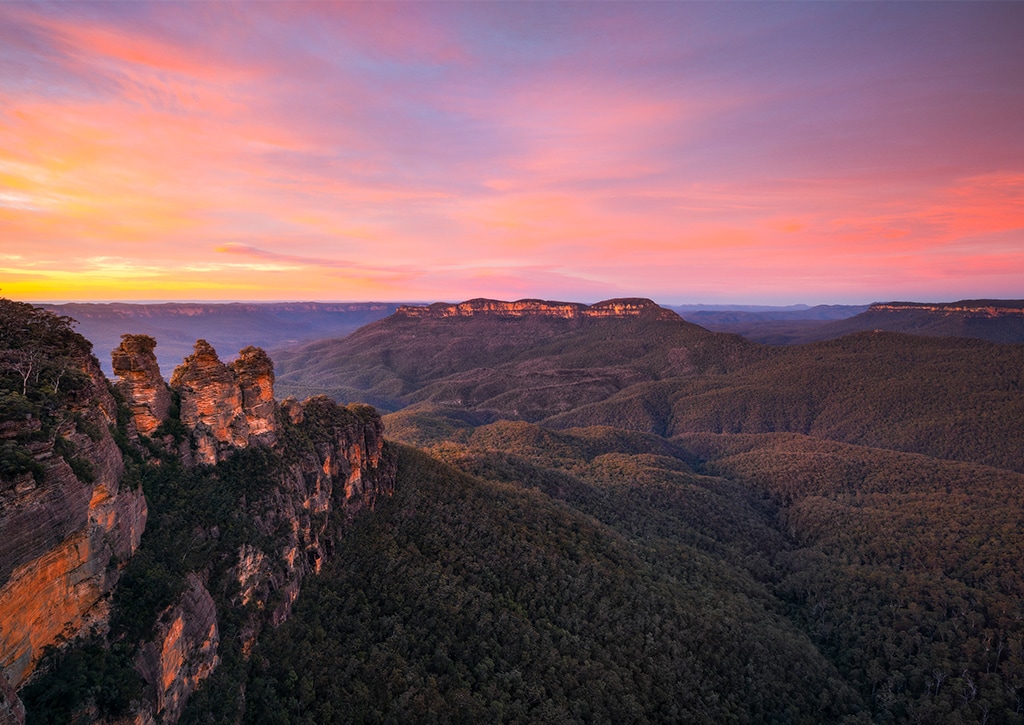
1. Blue Mountains
Known as Sydney’s ‘backyard wilderness’, see the forested valleys of the UNESCO World Heritage Blue Mountains National Park unfolding under the famous blue haze (created by eucalyptus oils in the atmosphere). See a bird’s-eye view of the famous Three Sisters up in the air on the Scenic World skyway, hike rainforest trails, spend the day visiting countryside bakeries and charming villages, dine overlooking the mountains and wander the Blue Mountains Botanic Garden in Mount Tomah, the highest botanic garden in the Southern Hemisphere.
When to go:
While the Blue Mountains is beautiful all year round, visit in spring (September to November) when flowers are in bloom or in autumn (March to May), when the air is crisp and cool, and the landscape is dotted with red, orange and golden leaves.
How to get there:
It’s approximately a 90-minute drive from the city along the M4 motorway. NSW Trainlink Intercity services (our train network) depart from Central Station in Sydney every hour and take about two hours to get to Katoomba in the Blue Mountains.
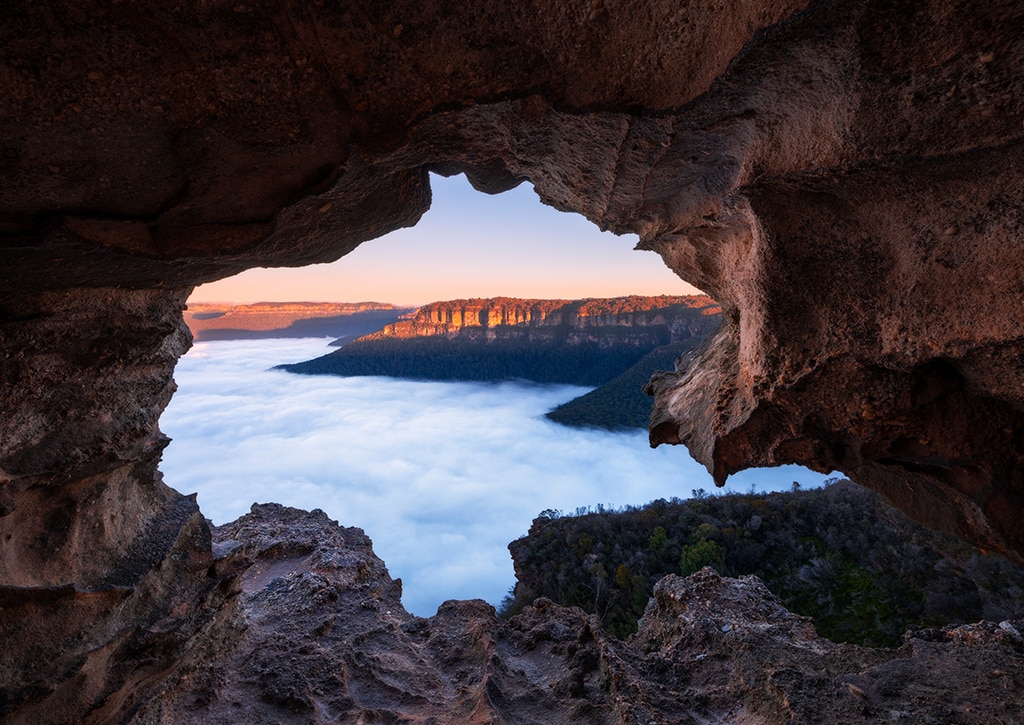


Natural Attractions:
• The Three Sisters: The World Heritage Blue Mountains National Park is home to the much-photographed sandstone formation, The Three Sisters. Echo Point at Katoomba is a top spot to view this incredible natural wonder and you can learn about the Dreamtime story behind the rocks: three Indigenous sisters, Meehni, Wimlah and Gunnedoo of the Gundungurra people.
• Golden Hour: Watch the sunset or sunrise from a vantage point over the forested valley as the sandstone cliffs turn gold. Local favourites are Govetts Leap in Blackheath or Cahill’s Lookout in Katoomba. Wear a coat and take a thermos of hot tea – once the sun sets, it can get very cool in the mountains.
• Jenolan Caves: Located at the foothills of the Blue Mountains, these remarkable caves are the oldest open cave system in the world! There are more than 40 kilometres of passages in the cave network, and you can book guided tours of different chambers. The Imperial Cave has the pretty Diamond Branch of pink crystals.
• Glow Worms: Take a magical evening tour into the Glow Worm Tunnel! In the darkness of the tunnel, you will see lots of small luminescent dots of the glow worms and you will be surprised at how bright they are in the dark.
Hidden Gems: Snap incredible views at some lesser-known vantage points such as Elysian Rock, Pulpit Rock and Honeymoon Bridge.
• Blue Mountains Botanic Garden, Mount Tomah: Visit this beautiful cool climate garden and wander among Wollemi pines, fairy grottos and vibrant flower beds. It’s Australia’s only botanic garden within a UNESCO World Heritage site.
• Lincoln’s Rock is a huge flat rock with brilliant views of Jamison Valley. The pale rock changes tone throughout the day with the movement of the sun.
• Stargazing: Embark on a captivating journey of the night sky with Blue Mountains Stargazing. Cosy up with a hot chocolate and search for stars on a professional telescope with a guide.
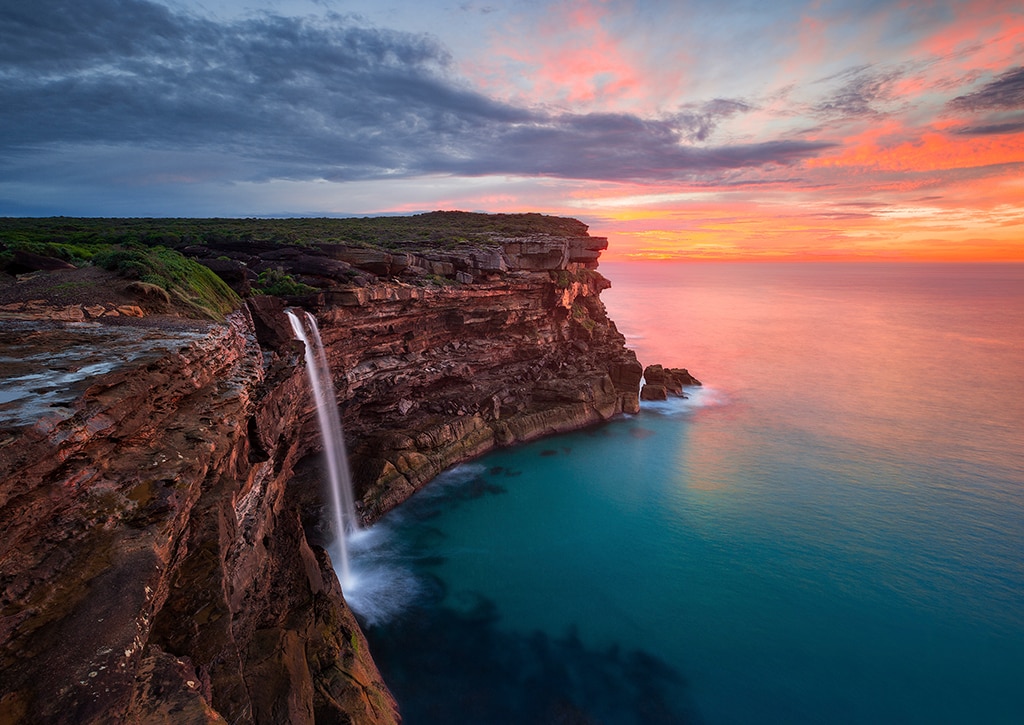


2. Royal National Park
With fabulous picnic spots, secret swimming holes and hiking trails, the Royal National Park is an ideal day trip from Sydney. Australia’s oldest national park forms the start of the Grand Pacific Drive Road Trip (the drive from Sydney will take you over the overwater Sea Cliff Bridge) and a place of stunning natural beauty with spectacular coastal cliffs, open grasslands, rainforests and sacred Indigenous sites.
When to go:
The Royal National Park is beautiful any time of the year. In spring you’ll see heathlands of wildflowers and winter is a wonderful time for a hike along coastal trails to hopefully spot whales.
How to get there:
The Royal National Park is near Cronulla, about an hour’s drive from the Sydney CBD. There is a per-car entry fee to the park. There are multiple entry points: several sealed roads, a scenic ferry from Cronulla to Bundeena, and a tram from the Sydney Tramway Museum in Loftus. The spectacular Grand Pacific Drive road-trip route winds through the park.
Natural Attractions:
• Wedding Cake Rock: Named because of its resemblance to a white layered cake, this fenced clifftop is a highlight along the Grand Pacific Drive and the pale-coloured rock contrasts beautifully against the golden sandstone of the coastal cliff.
• Wattamolla Beach: A secluded and pretty beach, Wattamolla has a picnic area, lookout and lagoon.
• Eagles Rock: A rare sight is this uniquely shaped rock – the large overhanging formation is shaped like an eagle’s beak.
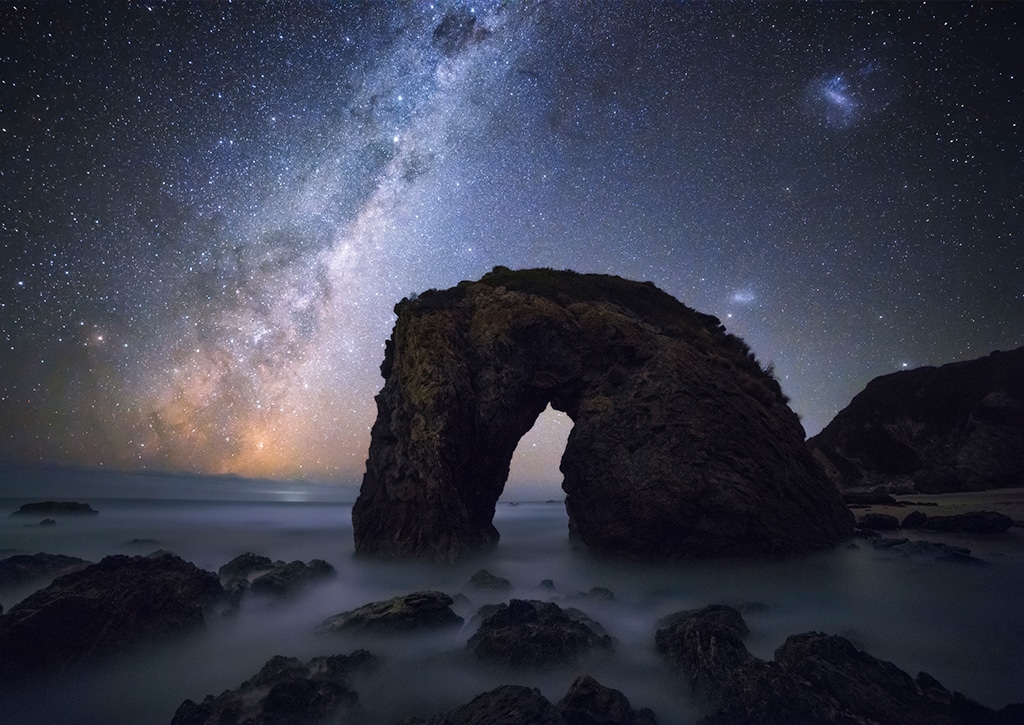


3. South Coast
The south coast of NSW has some of the whitest sand in the world, incredible coastal rock formations, sapphire-hued ocean and plenty of wildlife. Swim in the crystal-clear water, see kangaroos in the wild and take a tour to see fur seals and little penguins.
When to go:
If you want swimming and sunshine, the warmest months to visit are December, January and February. If you want to spot whales, humpback whale migration season sees these beautiful creatures swim along the NSW coast from May to November.
How to get there:
From Royal National Park, keep travelling along the route of Grand Pacific Drive, which winds along the lovely coastline to Wollongong, Shellharbour, Kiama and Jervis Bay. The Grand Pacific Drive takes you over the famous Sea Cliff Bridge, which sweeps out over the ocean.
Must-see rock formations:
• Kiama Blowhole: The blowhole is a natural rock formation where seawater shoots through and upwards, sometimes 20 metres into the air! This is the largest blowhole in the world; find it along the picturesque Kiama Coastal Walk.
• Cathedral Rocks: A magical sight and photographic opportunity, Cathedral Rocks have been shaped by waves and jut up out of the ocean. They can be viewed from Kiama Coastal Walk.
• Australia Rock: As its name suggests, this hole in a rock in Narooma looks like the shape of mainland Australia.
• Horse Head Rock: Located in breathtaking Bermagui, this is one of the oldest rocks in NSW and the distinctive horse-head-shaped rock is best seen from the platform on the elevated walking track.
4. Beach Beauty
With more than 2000 kilometres of coastline, NSW has plenty of beautiful beaches, unique ocean pools, world-class surf, fresh seafood and luxury resort towns to explore.
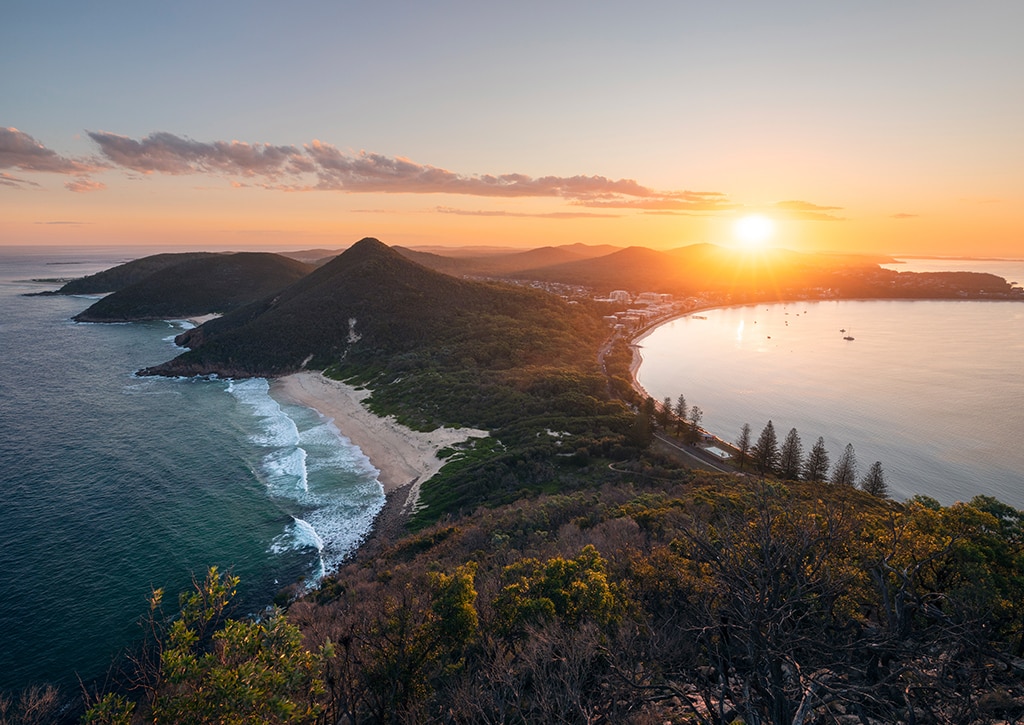


Port Stephens
About a two-and-a-half-hour drive from Sydney, Port Stephens has plenty of coastal beauty. With golden beaches, a vast sparkling blue bay and exciting water and shore-based activities, Port Stephens is an idyllic beach getaway and the dolphin capital of NSW. Take the invigorating short walk to the summit of Tomaree Head, 161 metres above the Port Stephens entrance. A must-see natural wonder is the extraordinary Stockton Beach Sand Dunes – they are the largest moving dunes in the Southern Hemisphere and at their peak can be up to 50 metres high. Book a camel ride, a quad bike tour or an Indigenous experience to explore them.
When to go?
Late June, early July is the best time to spot whales, it’s also a cooler temperature to visit the dunes.
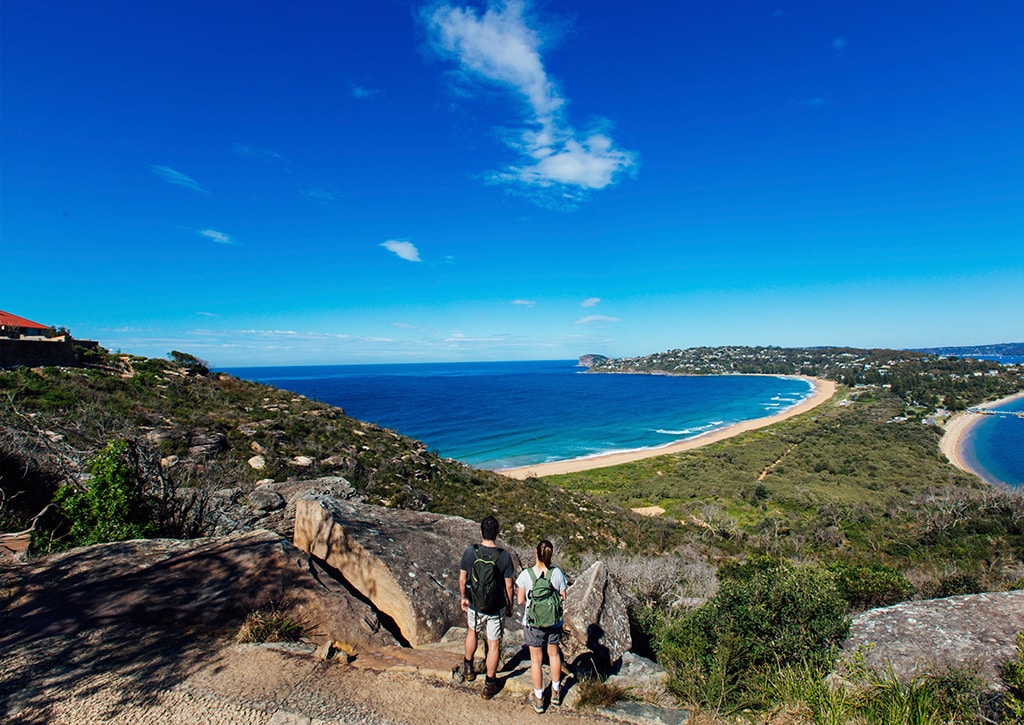


Palm Beach
Palm Beach is a narrow peninsula on the Northern Beaches of Sydney and is surrounded by water on all sides: Pittwater, Pacific Ocean and Broken Bay. There are beautiful beaches to visit in this area, all with distinctive golden-coloured sand. Palm Beach is Sydney’s northernmost beach and one of Australia’s favourite TV series Home and Away is filmed here. Other pretty spots nearby are Whale Beach, Avalon Beach and Bilgola Beach and the spectacular Barrenjoey Lighthouse.
When to go?
Idyllic summer months.
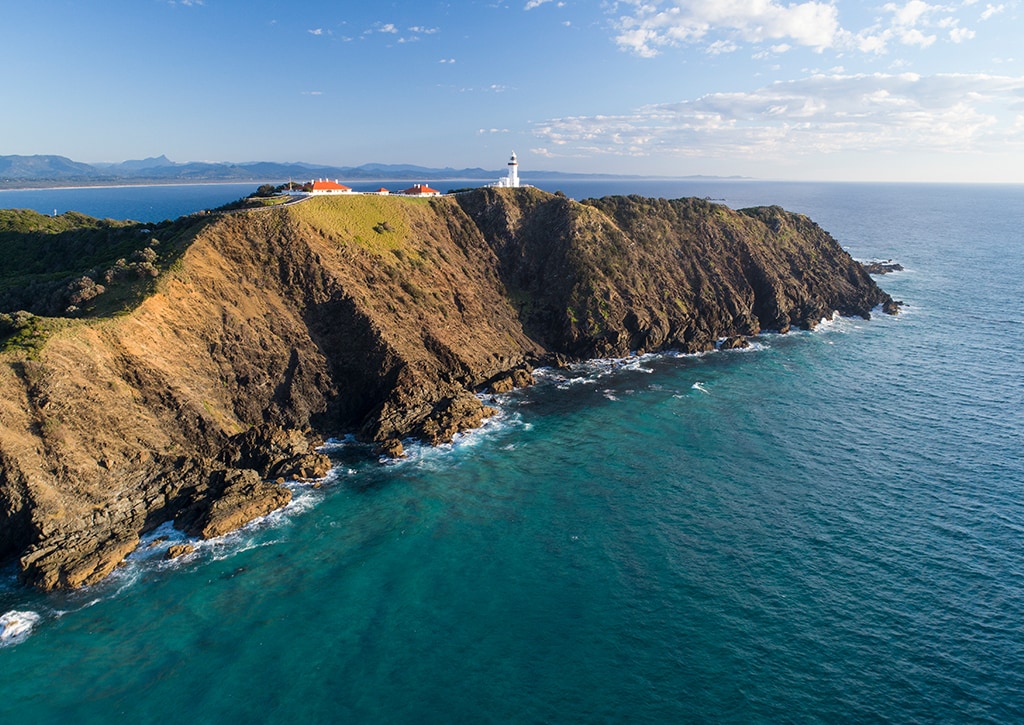


Byron Bay
One of the more famous towns in Australia, Byron Bay has unique natural beauty, great surf and a buzzing culture built on bohemian beginnings. Do a yoga class by the beach, walk up to Cape Byron Lighthouse, the most easterly point in Australia, learn to surf at The Pass and swim at picturesque Wategos Beach.
When to go?
Byron Bay’s mild, temperate climate makes it a perfect place to holiday year-round. The busy summer months are perfect for water activities like surfing, snorkelling and kayaking. Winter is a great time to spot whales in migration, head into the hinterland on rainforest walks or explore the Byron Shire’s incredible dining scene.
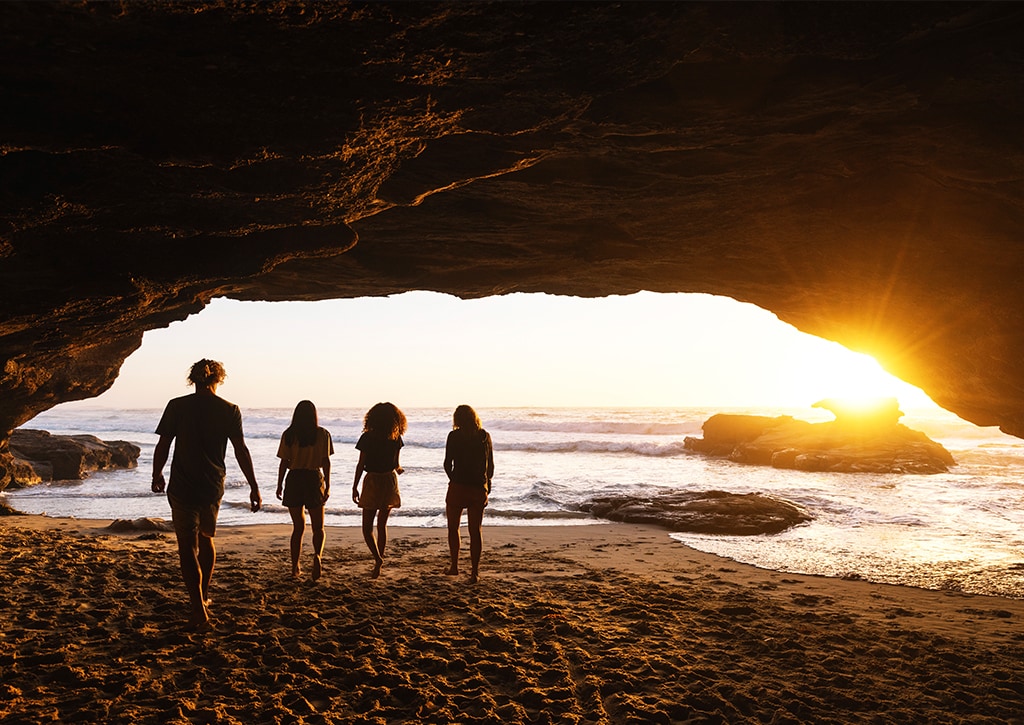


Caves Beach, Lake Macquarie
A popular photography spot in Lake Macquarie is the incredible Caves Beach with an intricate network of sea caves, which will have your imagination running wild as you look around the arches and crevices. A great photo opportunity is at golden hour from inside the largest cave looking out to sea. Just a 10-minute drive from here, Catherine Hill Bay is a State Heritage Listed historic mining village featuring a stunning patrolled beach, another popular photography spot.
When to go?
Check https://www.lakemac.com.au/Venues/Caves-Beach? and align your visit with the tides – the caves can only be explored at low tide.
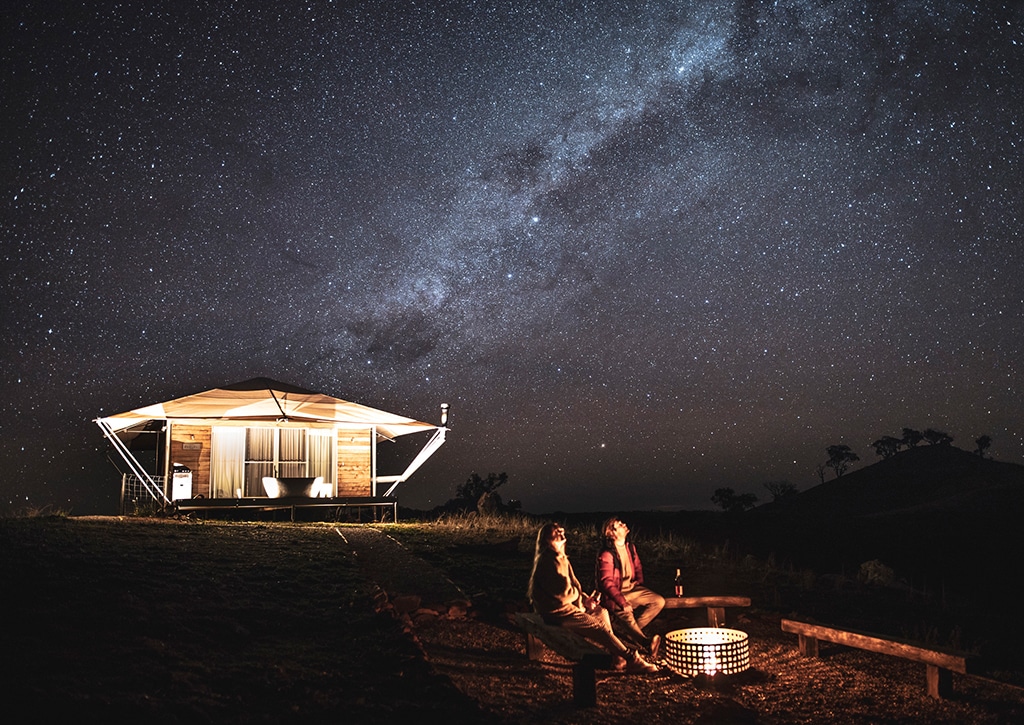


5. Stargazing
As the sun sets in NSW, a dazzling array of stars is revealed, especially in Central NSW where the landscape tends to be flatter and the skies clearer. NSW is home to Australia’s first Dark Sky Park, Warrumbungle National Park, where the low humidity and high altitude create the perfect place to view the Milky Way galaxy. Australia’s largest optical observatory is located on the outskirts of the park and offers informative daytime tours. For a stargazing experience, book a tour with Donna the Astronomer at Milroy Observatory in Coonabarabran at the foothills of the Warrumbungle Mountains.
When to go?
In spring the golden wattle flowers are out and the temperatures are mild enough for camping under the stars.
If you would like to glam it up under the star-studded skies, NSW has some luxurious glamping experiences from country to coast:
• Bubbletent Australia: Located in Capertee Valley in the Blue Mountains, sleep in a snug transparent sphere, which gives a brilliant vista of the sky.
• Sierra Escape: Gaze up at the stars from the outdoor tub alongside a campfire at this spectacular property in Mudgee dotted with five indulgent glamping tents.
• Paperbark Camp: This iconic glamping experience nestled in a eucalyptus forest on the South Coast offers safari-style luxury tents with wraparound decks to stargaze.
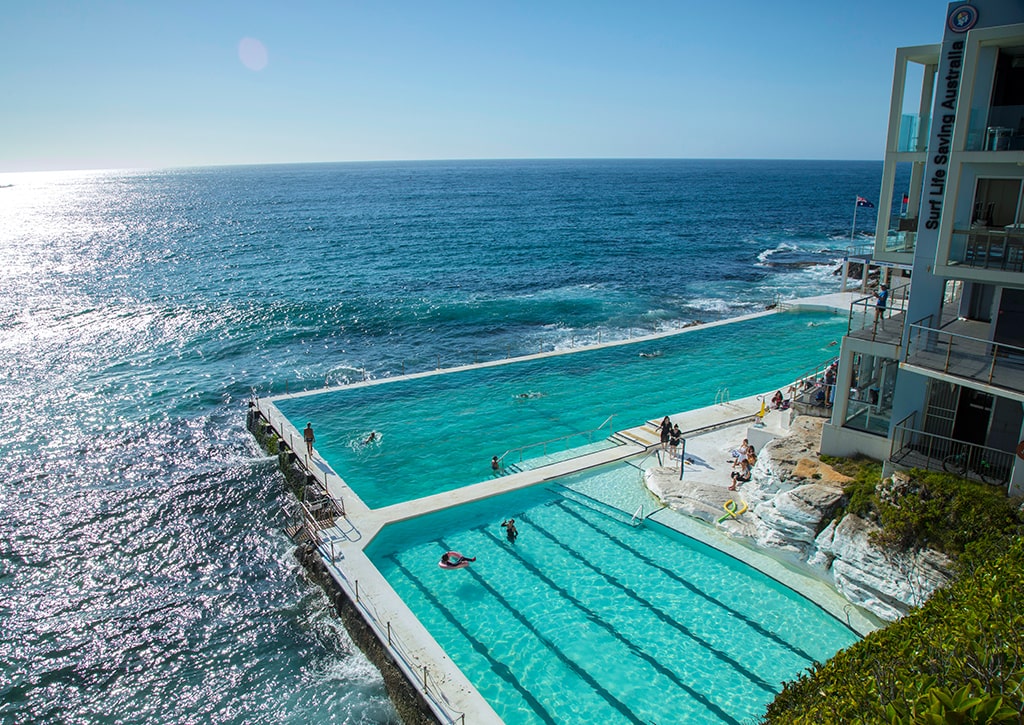


6. Ocean Pools + City Beaches
NSW has the most ocean pools in Australia – one hundred pools hewn from the natural rockfaces of the beaches where you can swim in the saltwater, protected from the surf. Here are some to pop on your travel list:
Sydney
• Bondi Icebergs: The gleaming white pool with the backdrop of Bondi Beach is a glorious sight.
• Bronte Pool: Rocks create a sheltered natural pool perfect for families, while an ocean-fed lap pool tucked in beneath the south headland provides one of Sydney’s finest saltwater swim experiences (free entry).
• Wylie’s Baths, Coogee: This popular pool has raised decking to spread your towel on, a kiosk and a view of Wedding Cake Island.
• Mahon Pool, Maroubra: This peaceful pool is nestled among rocky outcrops for a sense of seclusion.
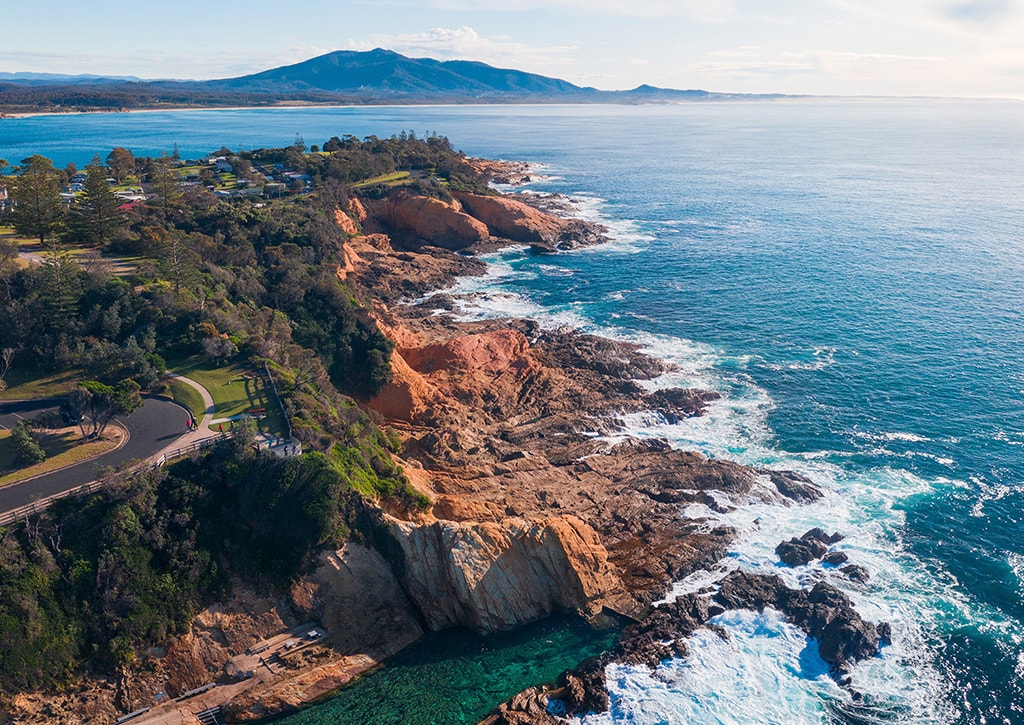


Across NSW
• Bermagui Blue Pool, South Coast: A pool so named as it perfectly reflects the blue sky above.
• Merewether Baths, Newcastle: An iconic ocean pool, this one is the largest in the Southern Hemisphere
• Blowhole Point Ocean Pool, Kiama: A safe swimming spot near Kiama’s famed Blowhole.
A beautiful and unique feature of Sydney is all the stunning beaches right on the city’s doorstep. Locals might finish work in the city and catch a ferry across to Manly Beach or take the bus to Bondi Beach for a swim. The city beaches and harbour coves are one of the reasons Sydney has such a relaxed, outdoor lifestyle. Bondi is a must-visit for its sheer natural beauty and laidback beach charm. Here are a few other glorious beaches and coves in Sydney to visit:
Manly Beach: One of Australia’s most famous beaches — the world’s first surfing contest was held here in 1964. A short walk up the Manly esplanade leads to Shelly Beach, a popular snorkelling spot home to the Cabbage Tree Bay Aquatic Reserve, where you can spot plenty of marine life.
Redleaf Beach: A harbourside beach in Double Bay with a kiosk and wraparound pontoon to walk on water.
Watsons Bay: This protected harbour cove is perfect for paddleboarding. Take the nearby South Head Heritage trail to see the red-and-white striped Hornby Lighthouse.
Balmoral Beach: A picturesque beach in Sydney’s north, it has an old-world elegance with tall palms and the Mediterranean-style Bathers’ Pavilion restaurant.
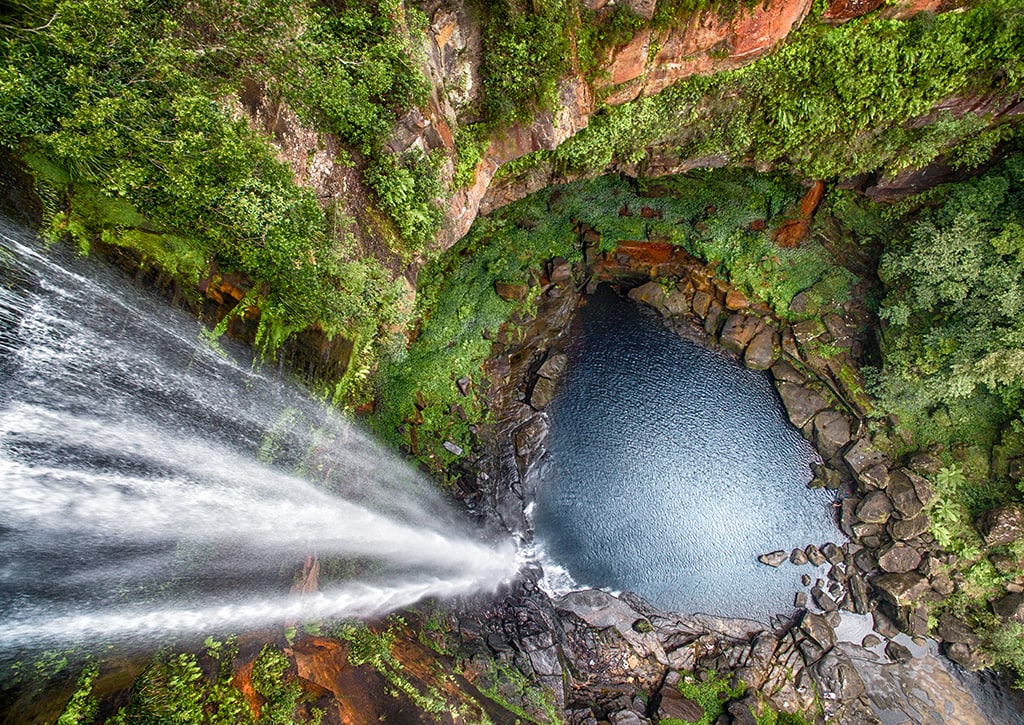


7. Wildlife and Waterfalls
Morton National Park: In the Southern Highlands near Nowra, this protected park is home to stunning gorges, rainforest and the magnificent Fitzroy Falls. From the visitors’ centre, there is a boardwalk with several spots to marvel at the water pouring more than 80 metres into the valley below. Join a short walking track to see views of Belmore Falls, a powerful plunge waterfall with two drops on the Barrengarry Creek, cascading over 100 metres. This is a wonderful place to stop on the way to Jervis Bay.
Booderee National Park: This is a magical place for animal and nature lovers. Nestled in Jervis Bay, Booderee National Park is where you’ll find secluded white-sand beaches fringed by coastal bushland and plentiful wildlife including kangaroos and swamp wallabies. Sunset and sunrise are the best times to see wildlife: listen out for footsteps and move quietly and slowly for the best encounters. Inside the park, you can also visit Booderee Botanic Gardens with more than 460 plants and several unique rock formations, including Hole in the Wall Beach, which gets its name from rocks shaped a little bit like the letter ‘u’.
Bouddi National Park: Located on the Central Coast near Gosford, north of Sydney, the beautiful Bouddi National Park offers spectacular diverse landscapes — from beaches and steep cliffs through to rainforest and heathland.
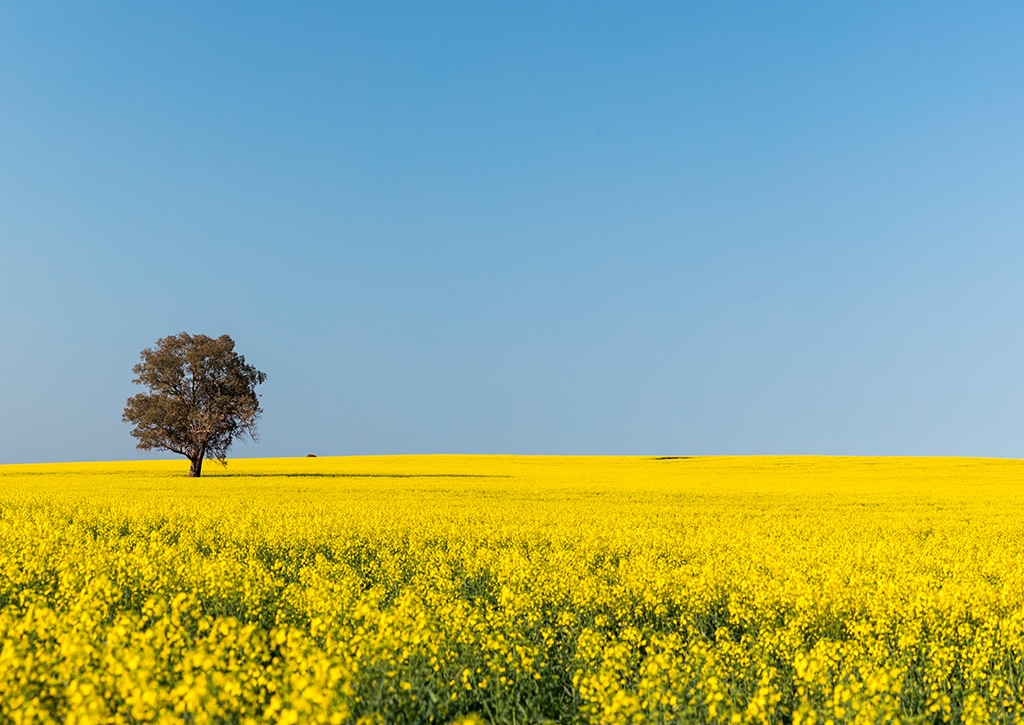


8. Flowers
Spring in NSW is a colourful and memorable experience with flower festivals, daisy fields and pockets of purple jacarandas in Sydney.
Jacaranda: From late October to November, the city of Sydney is peppered with these pretty purple trees.
Cherry Blossoms: The Cherry Blossom Festival is held annually in the Japanese Garden of the Auburn Botanic Gardens. Take a selfie in front of the pretty pink arch of delicate blossoms.
Tulips: Visit Bowral in the Southern Highlands in September for the iconic Tulip Time festival, where a vast garden of 75,000 tulips makes for a colourful display.
Canola Fields: The golden fields of canola flowers can be found on country roads between Young, Boorowa and Harden in the Riverina. The yellow flowers shine from August for around three months.
Paper Daisies: The paper daisy display at the Australian Botanic Garden in Mount Annan (Australian native plant garden of the Sydney Royal Botanic Garden) is an Insta-worthy moment with fields of pink, white and yellow native daisies covering more than 2000 square metres in September.
Sunflowers: Farm & Co Kingscliff on the north coast of NSW has some of the most glorious sunflower fields. Dress in your spring best and get a photograph among the tall, yellow sunflowers. It’s a $5 entry fee and Kingscliff is a great stop on the way to Byron Bay.
Autumn Leaves: Autumn is one of the most popular times to visit the Southern Highlands in NSW, when the picturesque heritage villages of Bowral, Mittagong, Moss Vale, Robertson, Berrima and more, come alive with golden, fiery colours.
Travel restrictions and regulations apply and are subject to change. Find out about the latest travel updates here.
Inspired to visit SYDNEY AND NEW SOUTH WALES?
LET US HELP
REACH OUT TO US AT +603 2303 9100 OR
[email protected]
You may also be interested in these articles:
